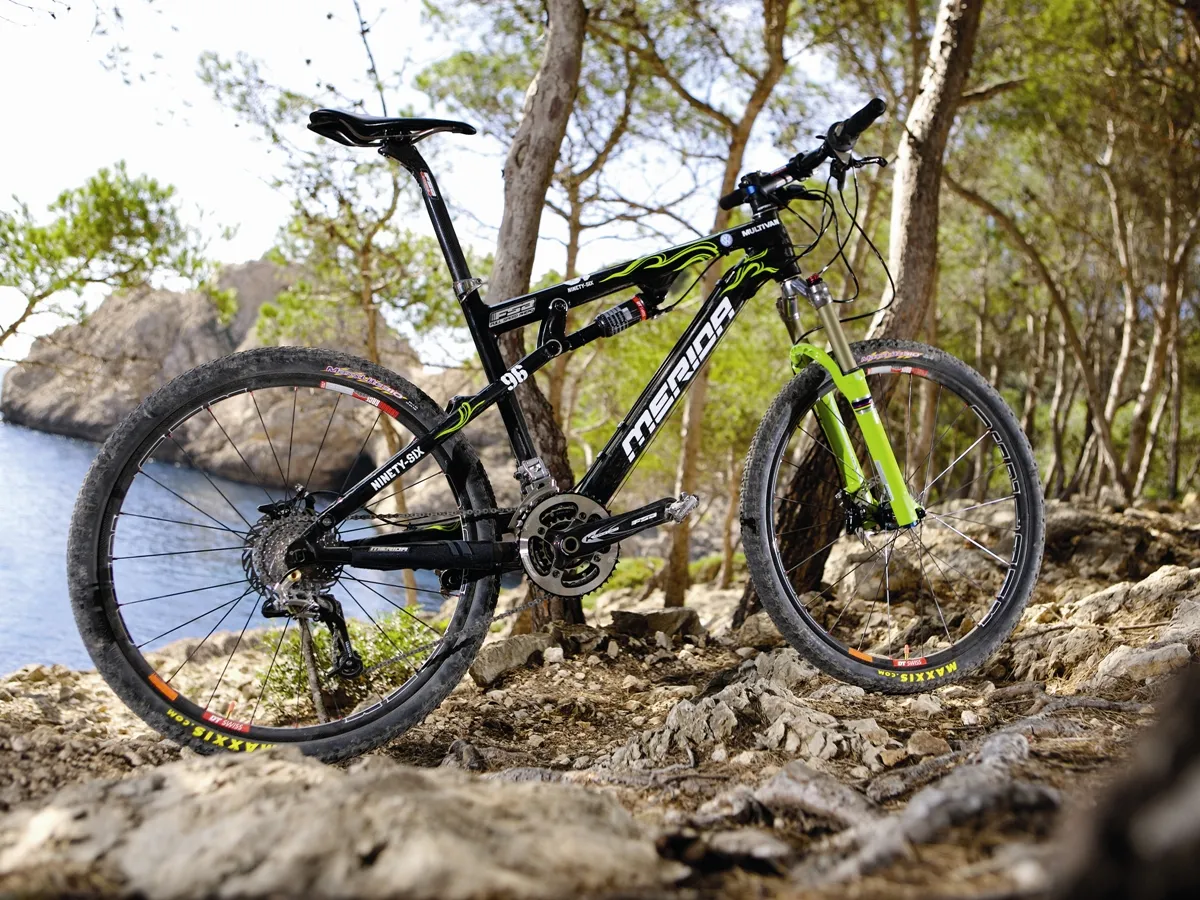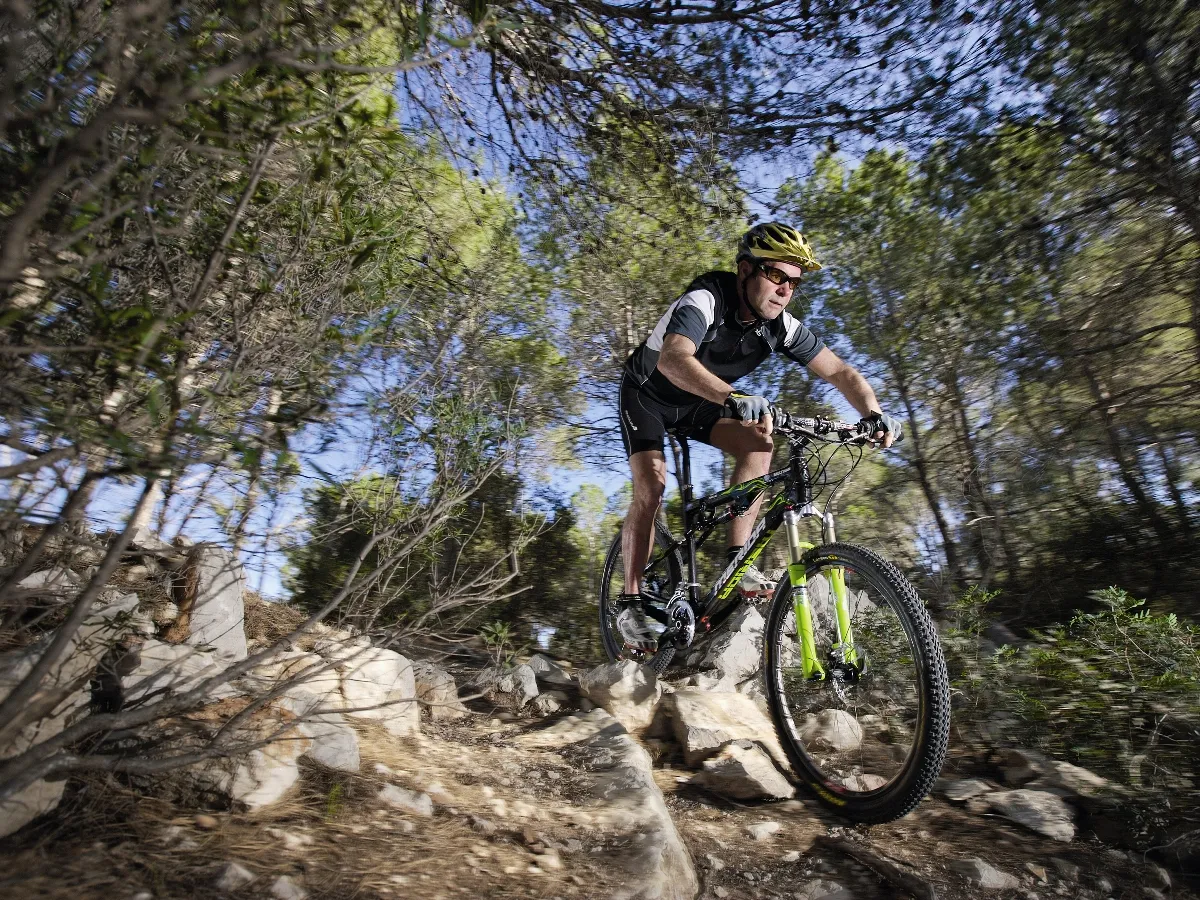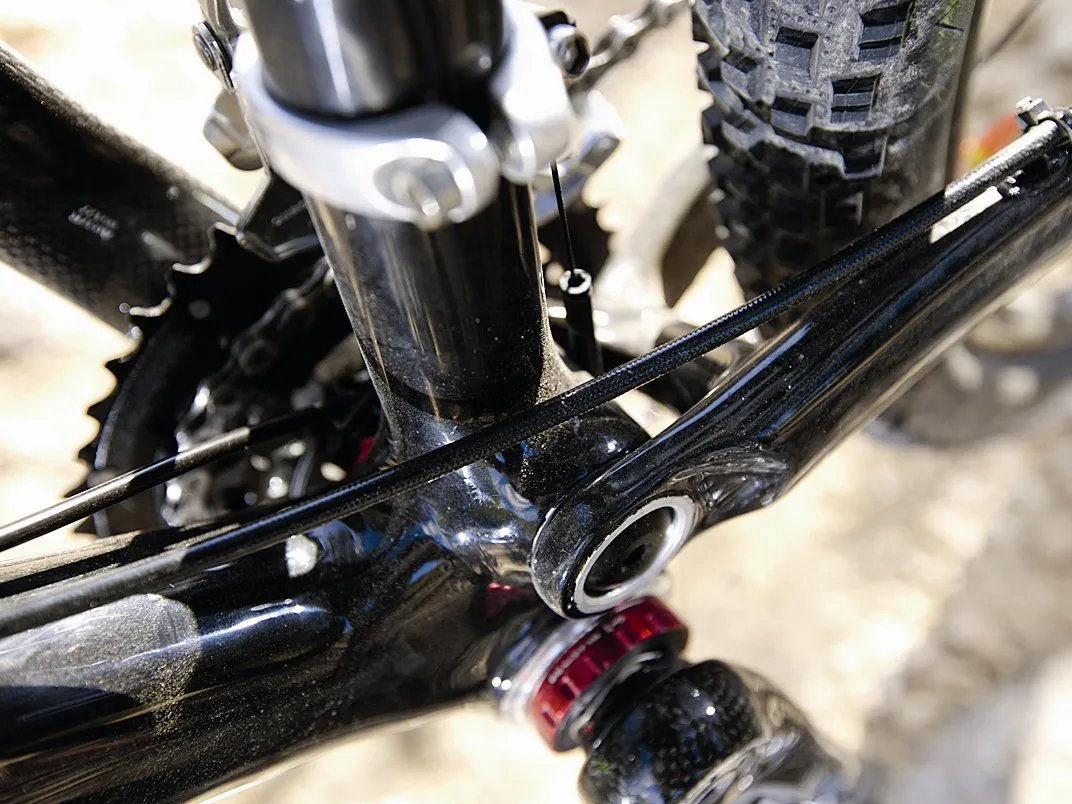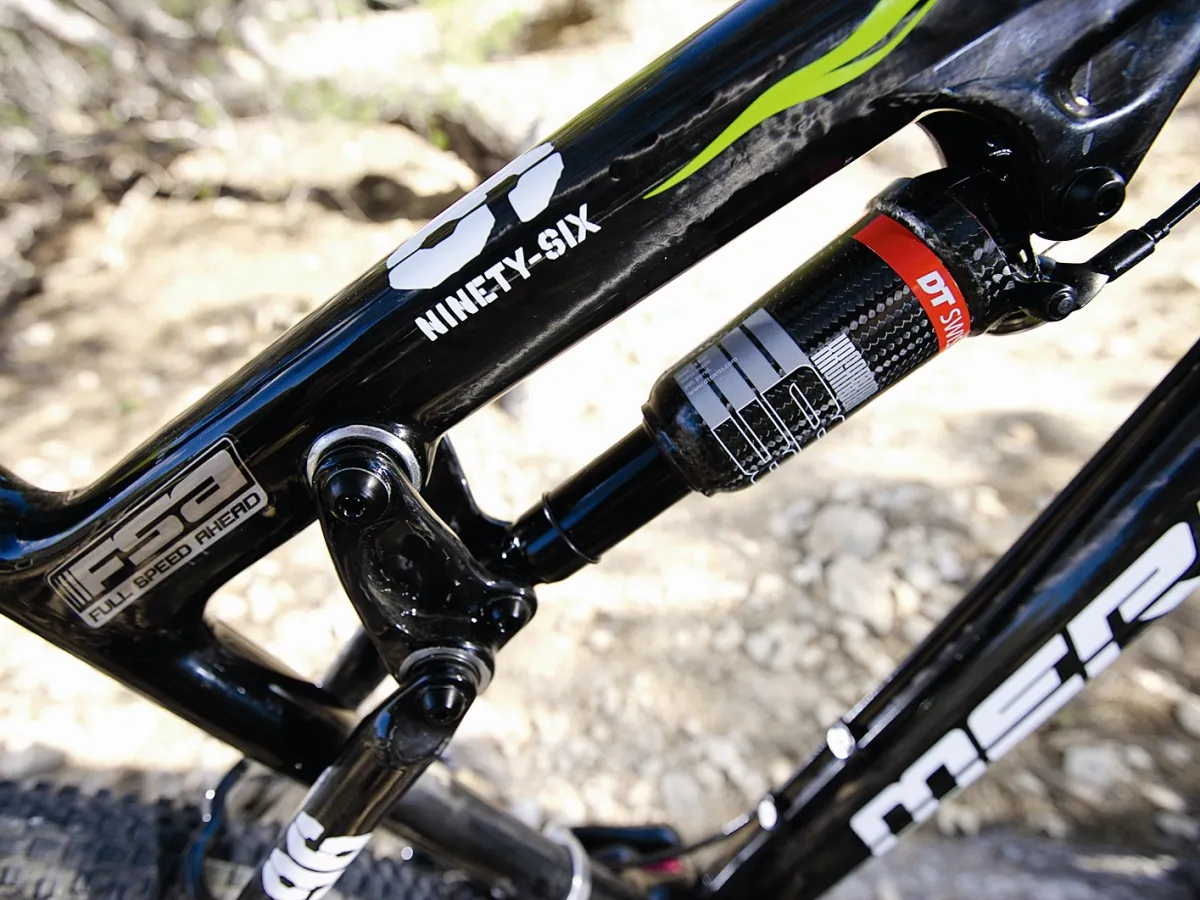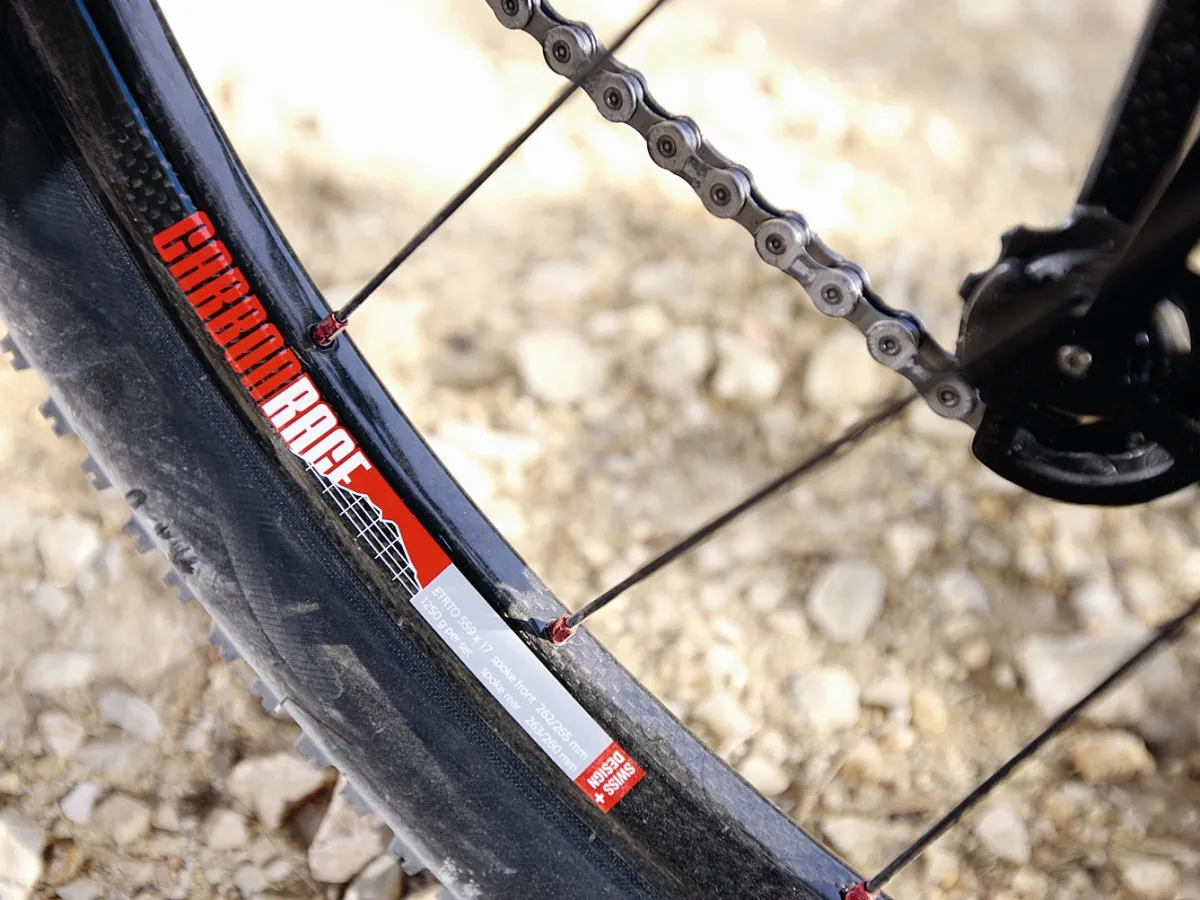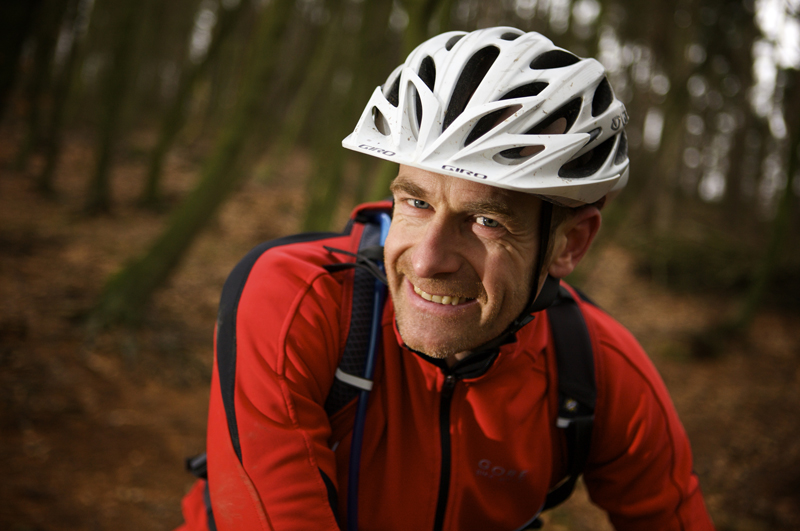Merida’s Ninety-Six cross-country suspension bike began as ‘Project Beijing’: a race-orientated suspension bike for the several Merida team riders in with a pretty good chance of an Olympic medal this August. It’s a superb featherweight race rig that takes some taming, but once you have its measure, it’ll let you explore the farthest reaches of your racing potential – for a hefty price.
When rumours started to emerge that Beijing’s mountain bike course might not be technically demanding enough for a full-suspension bike to gain the advantage, Merida settled on calling the bike the Ninety-Six – the amount of rear-wheel suspension travel it offers.
Ride & handling: easy speed, inspired climbing
We’ve only been treated to a couple of full days’ riding on the Ninety-Six so far, and first impressions were not 100% positive. This had very little to do with the bike, it’s just that thoroughbred race bikes take some time to get used to. There’s a learning process involved in getting the best out of any 20lb bike.
The low weight, narrow bars, stretched ride position and minimally treaded tyres all conspire to prevent you feeling totally at ease on technical trails. A little mental adjustment is needed on bikes like this. Instant, easy speed surges and inspired climbing of unfeasibly steep slopes are tempered by a feeling of skittish fragility on loose surfaces.
But this is the bike that rolled over the line in the silver medal position at last year’s cross-country World Championships in Fort William, so the negatives can obviously be tamed. How quickly you can tame them will depend on what sort of bike you’ve come from.
We felt reasonably at ease with the bike’s Bambi-like exuberance within an hour or two, but treads as sketchy as the Maxxis Flyweights are only suitable for firm and predictable terrain. Schwalbe’s 2in Furious Freds, fitted to the other bikes in the Ninety-Six family, are a more sensible option.
One of the most inspired attributes of the ride is the way the shock and fork work so well together. They never feel close to their limit when they’re properly set up, even though the O-ring markers show that you’ve been hitting full travel from time to time, and they offer just enough ‘give’ to stop the ride becoming harsh when they’re locked out.
The low leverage ratio of the frame/ shock configuration lets you keep shock pressures low for good small bump response, while also maintaining the lively feel that helps you feel that all the pedal energy is going into driving the bike forwards. In short, the Team-D is the perfect racer’s tool for the job.
The frame: gram-shaving nano-matrix carbon
The Ninety-Six frame is said to weigh less than 2kg, including the DT XR Carbon 50 remote lockout shock. For comparison’s sake, and because pro racers will often base their choice on this, the Target 8 hardtail stablemate frame is said to weigh just 1kg.
Both frames are made using what Merida calls ‘double chamber’ monocoques: each tube section has a bracing rib across its radius, creating a stronger structure than a same-weight single chamber tubular structure can allow. The main frame uses one monocoque for the top tube, head tube and upper part of the down tube, and another for the seat tube, bottom bracket and lower down tube.
In the full carbon rear triangle, the seatstays are tubes and the chainstays are monocoques. The right-hand dropout is also carbon – the left-hand one is aluminium because carbon isn’t suited to disc brake heat.
Designer Jürgen Falke tells us that while tube structure choice is crucial, the more critical issues to overall frame weight and strength are the use of pre-impregnated materials with a low resin and high carbon content, and the nano-matrix material that helps boost a frame’s impact resistance compared with frames made with epoxy-matrix material.
As if all that wasn’t enough, a few extra grams have been trimmed by using carbon for the shock’s rocker arm plus aluminium and titanium bolt hardware.
The single pivot suspension configuration is by no means unique, but its execution is superb. The Scott Spark – an obvious rival in terms of build, price and performance – uses pretty much the same sort of rocker link-driven set-up, as did bikes like the Rocky Mountain Element before it.
It’s a simple but very effective design that’s hardly affected by the pedal forces or rider weight shifts – especially when it’s fitted with a nicely tuned shock with a thumbshifter-operated lockout option to please those who like to feel hardtail responses from time to time.
Equipment: top-notch lightweight racer choices
The top dog ‘Team Green’ version of the Ninety-Six gets Manitou’s new R7 MRD 100mm fork with a remote thumbshifter lockout, and the sort of precision compression and rebound adjustments that racers love – you can effectively set it up any way you like. The rear shock is DT’s superb XR Carbon, again with a thumbshifter-activated remote lockout.
The drivetrain uses an FSA K-Force Lite crankset and SRAM’s top-of-the-range X.0 Gripshift-based gears, still the weight-conscious racer’s favourite.
Avid Juicy Ultimate brakes, with carbon levers and 160mm rotors, perform stopping duties; the wheels are DT’s finest XRC 1250s with carbon rims and shod with ludicrously light (330g) Maxxis Flyweight treads.
The finishing kit is pretty much the best you can buy: FSA’s K-Force carbon bar, seat post and OS99 stem, Eggbeater 4Ti pedals and Selle’s carbon-bodied, titanium-railed padded top saddle.
Verdict: release the cross-country beast within
Of course, there will always be people who simply have to buy the best, regardless of cost. If you’re one of them, a swap to more sensible tyres is probably all that’s necessary, but the £5500 5000D will be a better option for most riders. We prefer its black, red and white colour, full XTR group and DT XCR fork.
Let’s be realistic, though. Not many people can spend £5500 on a bike either. The £3000 3500-D would be a dream bike to most of us, as it comes with an XT groupset, RockShox SID fork and enough classy finishing parts to make forking out another £4500 on the Team version seem just silly.
Either way, the Ninety-Six is a superb race rig that’s bound to take many more riders to a podium place. With a smattering of personal favourite parts choices, you could realise your own latent performance potential, too.
Who’s Merida?
Merida is a Taiwan-based firm that was founded in 1972 to supply Raleigh with bikes – the first Merida factory was actually a replica of the Raleigh Nottingham factory. Merida claims it was also the first bike brand to develop a robot welding facility.
Its UK operation, set up in 1995, accounts for a small proportion of the bikes it sells Europe-wide, but with its 2008 range looking better than ever, we expect to see plenty more Merida bikes out on the trails.
Merida also makes bikes for loads of other brands, and its output from its three factories in Taiwan and China makes it one of the biggest bike manufacturers on the planet.
